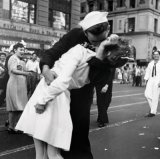So fare you well, my darling,
So fare you well, my dear,
Don't grieve for my long absence
While I am present here.
Since it is my misfortune
A soldier for to be,
Oh! try to live contented,
And don't you grieve for me.
I am agoing away to-morrow,
To tarry for a while,
So far from you, my darling,
About five hundred miles.
She wrung her lily white hands,
So mournful she did cry,
You will list as a soldier,
And in the war you will die.
In the battle you will be wounded,
On the field you will be slain,
You will burst my heart asunder
If I never see you again.
The cannons loudly roaring,
The bullets whistling by,
The fife and drum are sounding,
To drown the soldier's cry.
Stand steady by your cannon,
Make balls and grape-shot fly;
Oh! trust in God your Saviour,
And keep your powder dry.
I hope the time is coming,
When you and I will meet;
With words and kisses
We will each other greet.
So fare you well, my dear,
Don't grieve for my long absence
While I am present here.
Since it is my misfortune
A soldier for to be,
Oh! try to live contented,
And don't you grieve for me.
I am agoing away to-morrow,
To tarry for a while,
So far from you, my darling,
About five hundred miles.
She wrung her lily white hands,
So mournful she did cry,
You will list as a soldier,
And in the war you will die.
In the battle you will be wounded,
On the field you will be slain,
You will burst my heart asunder
If I never see you again.
The cannons loudly roaring,
The bullets whistling by,
The fife and drum are sounding,
To drown the soldier's cry.
Stand steady by your cannon,
Make balls and grape-shot fly;
Oh! trust in God your Saviour,
And keep your powder dry.
I hope the time is coming,
When you and I will meet;
With words and kisses
We will each other greet.
inviata da Bernart Bartleby - 25/8/2015 - 16:22
×
![]()





La fonte del testo che segue è il quarto dei dodici volumi di cui è composto Rebellion Record: a Diary of American Events: with documents, narratives illustrative incidents, poetry, etc. a cura di Frank Moore (1828-1904, giornalista), resoconto della Guerra Civile americana pubblicato a New York tra il 1861 ed il 1868.
L’autore della canzone sarebbe un soldato sudista (“rebel soldier”) di nome Levi F. Jones ferito nella battaglia di New Bern, North Carolina, combattuta il 14 marzo 1862.
In assenza di ulteriori riscontri, ho preferito attribuirla ad anonimo.
E’ interessante come diversi decenni dopo, precisamente nel 1937, i grandi ricercatori John A. ed Alan Lomax abbiano raccolto un testo - poi incluso in “Our Singing Country: Folk Songs and Ballads”, New York 1941 - pressochè identico dalla voce di una ragazza di Murrells Inlet, South Carolina, e lo abbiano introdotto con una testimonianza di una donna del Kentucky di nome Anna, la quale nel 1934 raccontava ai Lomax che dopo aver perso il suo amore nella Grande Guerra non si era più risposata perché non aveva più trovato nessuno come lui…